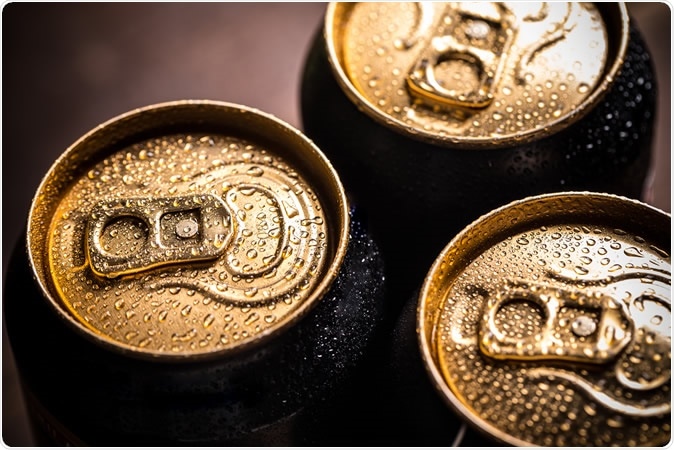Experts have warned that alcopops are posing a new threat to underage drinkers. These alcopops are ready-to-drink flavoured alcoholic drinks that contain more alcohol than usual, they warn. The latest study by George Mason University’s College of Health and Human Services (CHHS) and team note that some of the available alcopops are cheap and easily available to underage drinkers. The study was published in the latest issue of the journal Alcoholism: Clinical and Experimental Research. It was titled, “Price of Four Loko in Large U.S. Cities, 2018.”

Image Credit: grafvision / Shutterstock
The experts warn that drinking one standard can of alcopops constitutes binge drinking. Drinking more than one could lead to alcohol poisoning and even death they add. One of the leading companies selling these is the Four Loko that sells supersized alcopop to underage drinkers. Four Loko is the cheapest of all the brands, says the study. The authors of the study write that because of the high alcohol content and and low prices, there is a risk of higher consumption that could harm the youth and thus becomes a public health concern.
Study leader CHHS Assistant Professor Dr. Matthew Rossheim looked at the retail price of Four Loko in the large US cities with the team including Kayla McDonald, Reema Ahmad, and Sieka Siklo from the Department of Global and Community Health, CHHS.
The team writes that each of the 23.5 oz. cans contain three times the alcohol content than a regular beer. The containers are also twice the size of a regular beer. This means that the alcohol content of a six-pack of beer is being sold at less than $3 write the researchers. The team calls for policy makers to reduce the high “alcohol-by-volume (abv)” content of these alcopops, ban them altogether or increase their prices so that they are inaccessible to the youth.
Rossheim said in a statement, “It is unsafe for anyone to consume a single can of Four Loko in one sitting, let alone minors who have less drinking experience and lower body weight. Regulatory agencies should reduce the availability and alcohol-by-volume of these products and increase their retail price in order to reduce and prevent unsafe alcohol consumption.”
The researchers collected information regarding prices and sales of these alcopops from a random sample of stores from large cities in each of the states across the nation. They interviewed the retailers on availability, volume, abv, prices and discounts for buying more than one etc. of Four Loko.
The team looked at a total of 344 retail stores that had stocks of Four Loko. They noted that the average price of a standard alcoholic drink (14 g of absolute alcohol) was $0.54 for Four Loko products. They write, “an average of 17 standard alcoholic drinks could be purchased via Four Loko with $10.” Their abv was 14 percent compared to 12 percent of an average alcoholic drink and at lower prices.
17 State Attorneys General have earlier requested Four Loko to reduce the abv in their product that these have all been ignored. Further they recently introduced a product with higher alcohol content. The team of researchers call for investigations into the product from the Alcohol and Tobacco Tax and Trade Bureau to see if they are adhering to the federal definition for beer and if they are cheating on the state and federal taxes.
Authors of this study concluded, “Four Loko is among the least expensive ready‐to‐drink alcohol available for purchase in the United States.” Further they add, “consuming a single supersized alcopop constitutes binge drinking and is therefore unsafe, regulatory agencies should consider a variety of steps to reduce the availability and abv of these products and increase their retail price in order to reduce and prevent unsafe alcohol consumption.”
Rossheim is also working on another study that shows that attractive packaging of the alcohol products are increasingly raising their appeal to the youth.
Last year Rossheim published another study in The American journal of Drug and Alcohol Abuse that focussed on the harmful effects of Four Loko on young drinkers. He and his team write, “supersized alcopop - a high-alcohol-content, ready-to-drink flavored alcoholic beverage ... is currently regulated as beer.” He explains that the large amounts of additives as well as alcohol content do not meet the legal definitions of beer.
The team wrote, “From a public safety perspective, it is urgently important that the Alcohol and Tobacco Tax and Trade Bureau assess the formulation of supersized alcopops - specifically, the percent of alcohol in the finished product that is derived from additives.” They called for a reclassification of these supersized alcopops as distilled spirits so that the youth would have limited access to them. They also called for “increased price and reduced availability at the retail locations where youth most often obtain alcohol.”
Sources: